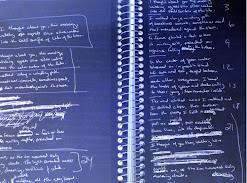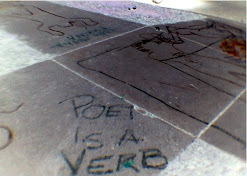Today's poetry book club day! Hooray! I'm secretly posting from work right now, so I'm going to leave some questions here and then answer them later in the afternoon, during my lunch break.
Discussion Questions
Overall, did you like the book? What about it did you like?
Were there specific poems that spoke to you? Which ones? Why?
Was there anything that confused you about the overall book? What was it?
Were there any individual poems that confused you?
What would you say is the overall theme of the book? Which poems best carried out that theme?
How would you describe the author's style? How did she use language to convey images, ideas, or voice?
That'll be a good start...if you have any questions for the group, or answers to the above, post it below! Happy Book Club Day!
Monday, May 21, 2007
Poetry Book Club, Inaugural Discussion Post
Posted by Jessica at 8:14 AM
Labels: poetry book club
Subscribe to:
Post Comments (Atom)



11 Comments:
…deb here. I liked the book enormously. It was descriptive and emotive, personal and historical, but mostly accessible to my ears and mind. Her language was elevated but not unfathomable.
It’s hard to choose just one favorite, but my first reading found Myth the most memorable. I was struck by how she mirrored the lines and how they held, yet changed. Magical. But I also thought the title poem, Native Guard was amazing. How the piece built, the use of diary, different voices. All woven into a historic tapestry.
Confused? Not so much by the works but by something so slight as to seem petty to say (write) out loud. Her photo on the back cover looked so blond, at first glance I thought she was white. Then as I read the work (not knowing anything at all about her) I thought—she must be black—the understanding of the south was so deep, but I was confused. Last week’s Sunday NYT’s Magazine had a one page interview with her (you know, one of those quick but insightful pieces—there’s a link on my blog for last Thursday if you need help finding it) and her hair was much darker. And some of her heart-breaking story was told. The pieces about her mother became even tenderer. I couldn’t imagine having that as part of my own story. So I suppose I would go back and back to section 1 the most in rereading the work.
Her style (I am not very good at this—which is part of why I want to join you all in discussion)—is a personal and historical narrative. Sometimes the two are intertwined. She seems to structure many (most? I didn’t inventory them) of her poems. Her rhymed poems (Elegy…) are so wonderfully crafted I didn’t even see the rhyming until I read some passages out loud to myself.
I wonder if this work is similar to her other published works. Jim mentioned he likes Bellocq's Ophelia very much. I want to read everything by her, now.
Sorry this took so long. Today was the first day of classes, so lunch break is 5 minutes before going home.
Great comments deb! I agree that Myth and Native Guard, as poems are incredibly strong.
Being a form nerd, I totally loved that Myth had the two sections that could be read both frontwards and backwards. I wrote "holy crap" in the margins of the book, once I recognized the form. I don't even know if that has a name...anyone know?
Also, stylistically, I loved how the images in the end line in the individual sections of "Native Guard" became the altered first lines of the next section. I noticed that she also did that poem to poem, especially in the first section...like the movement from "Graveyard Blues" to "What the Body Can Say."
I will say at first I was a little perplexed by the first section of the book, but only after moving into section 2. I had a difficult time connecting the two sections thematically -- the personal stuff about the mother and the cultural stuff about the South seemed so disconnected.
Speaking of the mother stuff, the poem "Photograph: Ice Storm, 1971" totally threw me for a loop. For some reason, the ending seemed to be so abrupt.
I also found myself wondering who the speaker was, especially in poems like "After Your Death." Is this the daughter speaking to a spouse or mate? The mother speaking after the death of the husband? Or the daughter speaking after the death of the father figure?
If I had to choose a theme for this book, I would say that it's history's effect on personal identity -- both personal history and cultural/political history. But I'm having a hard time with that question.
As for style, this is also a difficult question. I agree with deb that she uses form, but it is also very colloquial and accessible.
I will post more later, but it is time to go home and read some of this book again. :)
Last thoughts before my day's end.
I read most of the book before reading the NYT's article. I am sure I gained clarity about subject (although the amazing language stands all on its own)after reading the interview. Afterwards I do recall saying, oh, that makes sense, especially pieces I reread.
And I think you're right, Jessica about the forms. They were striking and wonderful, but the poems also reminded me of great buildings. I almost didn't see the structure, the rational creating the work, so charmed was I by the voice, the authority, the being of the poem.
Thanks for prompting me to read this!
I like your analogy of the form in this book... it is quite apt. I normally didn't feel the form until the end of the poem, which is frankly the way it should be. It shouldn't hit you over the head with how good the form is.
I was wondering what you felt about the final section. I just read it again, and in some ways, it seems to be a nice ending to the book. Some personal poems about race, some historical (?) poems about race. But, I still feel a bit of disconnect between the narrator's experience and the old South experience. Perhaps I need to read that interview to help out...
Overall though I think this is an awfully accomplished book. It uses very smooth language to tackle a very emotionally and politically complex issue.
Thanks for reading it with me!
For anyone interested, here is the link for the NY Times Article that deb has posted on her blog, . Enjoy and thanks to deb for sharing it!
Yikes -- that last link was awful. Deb's blog is called stoney moss and you can find it at http://stoneymoss.blogspot.com/. Sorry!
Hi Jessica,
For me, I think the epigraphs at each section are my clues: first there's her mother, then a broad historical look at the south--with its race issues, then personal history of the south--with it's race and parental issues. All of this tied together, albeit uncomfortably and oddly while we get our sea legs under us, by her overarching epigraph, her poem Theories of Space and Time, captured (for me) in that first line: "You can get there from here, though/ there's no going home."
I hear her say her home, her history is broad and narrow: country, family, town, region, mother, epoch.
It's a complicated weaving of time and space, indeed.
Even her quotes are amazing: a spiritual, Nina Simone (singing one of the great civil rights songs), and Whitman. She is all over the "map" when she travels to the home she can't get to. (I don't know Charles Wright.) She completely blows me away. I had a couple of those "holy shit" instances myself, looking at what she'd done, after the fact. Like a magician who shows you his trick, after you've been "had"!
I am so very glad to have read this. Thanks again for thinking this up!
And glad for getting to chat about it...helps me to really think about what I think :-)
Hi Deb and Jessica,
I apologize - I'm a little late to the party - Jessica, your post about swallowing poems when life intervenes really spoke to me this week. But, I *did* read and I am so glad you started this, Jessica, because it got me reading.
What fascinates me is how I was so excited about myth and how I couldn't wait to talk about it... how subtle and yet perfect the form is for the poem, how haunting the poem - and then I come here and discover that this one spoke to you both as well!
Are either of you thinking about attempting a poem in this form?
Hi Sasha,
I'm glad you enjoyed the book and the poem "myth." I don't know if I would be able to accomplish something like Myth. It seems like such an organic form, when she uses it in that poem. It's also so complex, I just don't see myself pulling it off. But I do like a form challenge...:)
Are you going to try it?
Hi Jessica, don't know if you'll see this before you leave for Iowa. But yes, I am going to try it. No specific deadline, but I will keep it on my radar screen until the right idea comes along.
I was talking about it with some friends recently and realized it is a lot like walking a labyrinth... you read into the center, and then back to the starting point, but you and the poem are transformed in the process. I'm completely enthralled.
Post a Comment